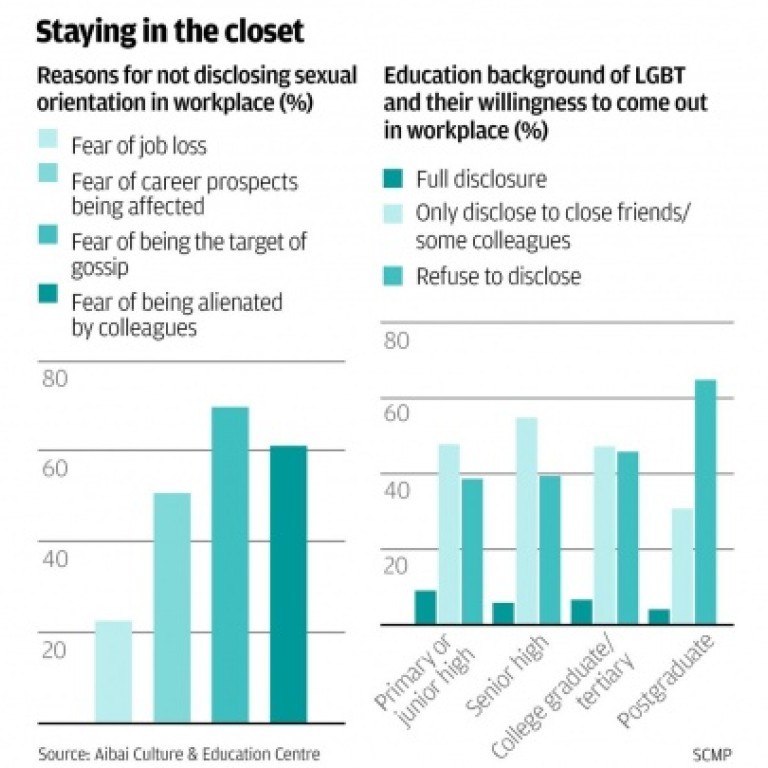
Fear of abuse keeps bulk of Chinese gays in closet in workplace
Just 6.29pc are completely open about sexuality on the job, where jokes, abuse intimidate many
More than half of lesbian, gay, bisexual and transgender (LGBT) people on the mainland have heard colleagues use insulting language or tell offensive jokes about LGBT people, resulting in most choosing to stay in the closet, according to a report released in Beijing yesterday.
The first report of its kind on the mainland, based on an online survey of more than 2,000 LGBT employees aged 16 to 60, it found that only 6.29 per cent were completely open about their sexual orientation, although 45.63 per cent said they had made their sexuality known to a small circle of good friends and colleagues.
A similar survey in Europe, sampling 93,000 people in the 27 European Union countries plus Croatia, found two-thirds of LGBT people were still afraid to show their sexuality in public and a quarter had been victims of physical or verbal attacks
On the mainland, a third of respondents said they had witnessed verbal abuse in the workplace against other LGBT colleagues, and about 7 per cent said LGBT colleagues had encountered bullying or violence by co-workers.
The Report on the Employment Environment for LGBT Employees, sponsored by the US embassy in Beijing, was released by the Aibai Culture and Education Centre and other LGBT rights groups on the International Day Against Homophobia.
Its chief author, Huang Yaohua, said gays and lesbians in small mainland cities were more inclined to keep their sexuality to themselves, as were LGBT employees in state-owned enterprises and government agencies, because they feared discrimination based on their sexuality could hinder career prospects.
What was most surprising, Huang said, was that better educated mainland LGBT employees were more cautious about disclosing their sexuality; 64.5 per cent with postgraduate degrees choose to stay in the closet, compared with 47.6 per cent of the broader LGBT community.
It goes against the popular wisdom that the more LGBT people are educated, the more they're open about their sexual orientation
"It goes against the popular wisdom that the more LGBT people are educated, the more they're open about their sexual orientation" he said. "It might have to do with the fact they're more career-oriented and more concerned about the impact of coming out on their careers."
The head of Parents, Families of Lesbians and Gays in China, Hu Zhijun , said the reluctance of highly educated LGBT people to come out was a phenomenon largely unique to the mainland, and could be a result of lack of rights protection, particularly in the workplace.
More than 80 per cent of companies in the United States have policies that explicitly prohibit workplace discrimination based on sexual orientation, including in staff recruitment.
A project co-ordinator from the International Labour Organisation's Beijing office, Zhou Haibin , said protecting the rights of LGBT employees was hardly on the agenda of mainland companies because there were virtually no laws to protect their rights in the workplace.
An employee at a Beijing-based magazine said his decision to come out at work meant he no longer needed to hide his sexuality. However, it had exposed him to possible hostility and insults from colleagues; one of his male colleagues once fled the office toilet after seeing him there.
"Such harm is even more horrible than actual physical assaults and, even worse, I have no one to turn to if I want to complain, but have to keep it to myself or my gay friends," he said.
